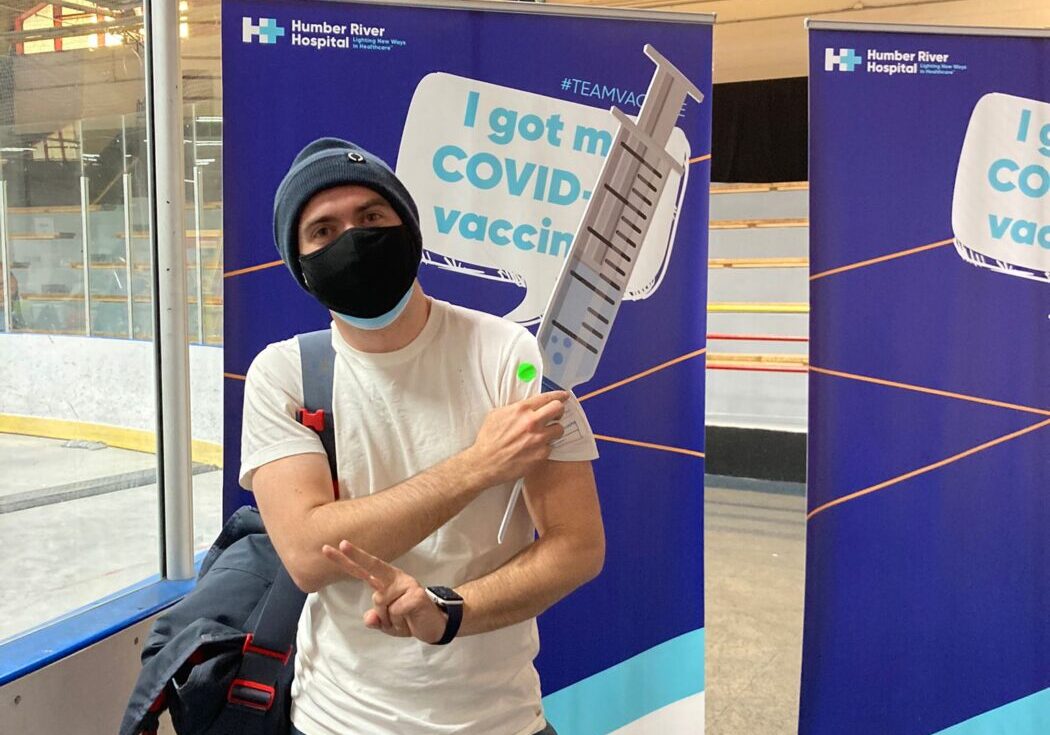THE GREEN LINE
original STORY
Everything you need to know about getting COVID-19 and flu shots in Toronto
Last month, flu and COVID-19 vaccines became available for everyone who lives or works in Ontario. Here’s a rundown of why, where and when you can get vaccinated.

Last month, flu and COVID-19 vaccines became available for everyone who lives or works in Ontario.


andrew rock
Malvern native and student in Centennial College's journalism program. Gardening enthusiast, avid reader of both fiction and nonfiction, and lover of all things sci-fi and fantasy.
Dec. 3, 2024
It's that time of the year again! Cold and flu season has made its way around — with COVID-19 added in the mix.
But with another season of respiratory viruses, comes another reason to brush up on the latest vaccine recommendations.
As of Oct. 28, 2024, flu and COVID-19 vaccines are available for everyone six months or older who live or work in Ontario. Canada has also recently introduced Pfizer-BioNTech’s new COVID-19 vaccine, Comirnaty, to the list of authorized and available shots.
So, here's a summary of everything you need to know about getting vaccinated in Toronto.
why get vaccinated?
Vaccines for the flu as well as COVID-19 have been proven safe and effective in protecting you from getting infected — and their benefits outweigh the risks of an infection.
And honestly, nobody likes being sick. You feel awful and it stops you from doing the things you want to do — and let's be honest, no one has time for it.
- Between buying medication and taking time off work, being sick is expensive.
- By getting vaccinated, you can help protect the people you love and your community.
- There is always the possibility of complications from viruses and the best way to avoid them is not to get sick in the first place.
What vaccines are currently available?
Let's state the obvious: as similar as the symptoms for these two diseases can be, you cannot prevent COVID-19 with a flu shot and you cannot prevent the flu with a COVID-19 vaccine.
But you can — and it is advised that you do — get both your vaccinations at the same time if possible. Here's a quick rundown on the types of COVID-19 and flu vaccines currently available at clinics and pharmacies.
There are three types of COVID-19 vaccines.
- mRNA vaccines (such as Pfizer and Moderna) work by introducing a small portion of messenger RNA or mRNA, which is a type of molecule used to transmit information with a specific chemical instruction into our cells. The cells of your body then use these instructions to create a small piece of spike protein that is similar to what is found on the surface of the coronavirus. This process will train your body to recognize and attack the virus. PSA this does not affect your DNA.
- Protein subunit vaccines like Novavax include small pieces of the coronavirus (but not enough to get you sick). Once injected, they stimulate the body’s immune response. This type of vaccine has also been used for years to treat Hepatitis B and shingles.
- Viral vector-based vaccines use a harmless virus to deliver a small piece of the coronavirus that cannot infect you on its own. When injected, this vaccine triggers an immune response from your body which learns how to target the virus that causes COVID-19. The Johnson & Johnson vaccines are an example of viral vector-based vaccines.
As for flu vaccines, you will primarily come across the below options in clinics and pharmacies.
- FluLaval Tetra and Fluzone® QIV, which are quadrivalent vaccines, meaning they are designed to help fight four different strains of the flu virus. These vaccines are egg-based so you should avoid them if you have an egg allergy.
- Flucelvax® Quad is also a quadrivalent vaccine but since it does not use egg proteins, it’s suitable for those with an egg allergy.
There are classically two ways these vaccines are administered: the conventional injection “shots,” or nasal spray — also called “flumists.” In both cases, you receive an inactive or weakened flu virus that cannot make you sick but can trigger your immune system to create antibodies that target the flu virus.
For those 65 years and older, there are three doses of flu vaccine available in the 2024-2025 season.
- The standard dose which protects against four strains of the flu virus.
- The adjuvanted vaccine which includes an element that will cause a stronger immune response.
- The high-dose vaccine which has more ingredients that will boost the immune response.
Both the COVID-19 and flu vaccines have their share of reactions and side effects, and for the most part those reactions are very similar. Both vaccines can cause muscle aches, joint pain, headaches, redness and swelling at the injection site. The COVID-19 vaccine may cause swollen lymph nodes, chills, dizziness and nausea. Whereas flu shots may cause irritability, drowsiness and a lack of appetite in children. While most symptoms will resolve on their own within days, you should seek medical attention if you have trouble breathing or if you develop a rash or swelling of the face and throat.
Where to Get Vaccinated?
Anyone who is two years or older can get vaccinated at most pharmacies, clinics and hospitals but it's always a good idea to call or contact them first to see if an appointment is necessary.
Children six months to two years of age should be vaccinated by a doctor or nurse practitioner or at a medical unit.
Government booking tools:
- You can use the City of Toronto public health booking system to help with all forms of vaccination, not just flu and COVID-19. It can be found here.
- You can use the Government of Ontario COVID-19 vaccine booking system, found here to search for a vaccine appointment based on your postal code.
- You can also call Health Connect Ontario at 811 to access health services information or speak with a registered nurse. They operate 24 hours a day seven days a week.
Pharmacy booking tools:
- You can book through The Shoppers Drug Mart flu vaccine and COVID-19 scheduling and information tool.
- You can use the Rexall Pharmacy flu vaccine and COVID-19 scheduling and booking tool.
- You can also try Costco Wholesale Pharmacy which provides both flu and COVID-19 vaccinations. You can check their site here for appointments.
For those who are homebound and unable to commute to get vaccinated, the Toronto Paramedic Services offers vaccination through their Paramedicine Program which runs seasonally from October to March. You can be referred to the program through your primary care provider or care home coordinator. Those without outside support can contact the Toronto Senior Helpline for more information.
When should you be getting vaccinated?
Here are the latest recommendations for the timing of COVID-19 and flu vaccine appointments.
If you've already had a COVID-19 shot, the City of Toronto recommends that you get your next one within six months, with a minimum of at least three months from your last vaccination date. If it’s been longer than six months, don’t worry, you can absolutely still get your shot .
For those who are immunocompromised, it's recommended to receive extra doses of the COVID-19 vaccine beginning at three to six months since your previous shot, at an interval of four to eight weeks between doses.
If you're pregnant you can receive the COVID-19 vaccine at any point during the pregnancy, but it's recommended you discuss it with your doctor beforehand.
As for the flu vaccine, it’s much simpler: everyone six months of age or older is recommended to get the flu vaccine every year.
How To Get Tested?
We know COVID-19 and the flu share a lot of the same symptoms.
Fever, cough, sore throat, headaches, nausea, and muscle aches are all signs to watch out for. But heart attacks, strokes and pneumonia are some of the more serious complications that can arise. So if you’re feeling sick it’s important to get tested. Here are some places you can go to do it.
- You can search the Ontario Government listing of pharmacies where you can get tested for COVID-19.
- You can also use the government of Ontario's online COVID-19 testing tool.
Fact-Check Yourself
Sources and
further reading
Don't take our word for it —
check our sources for yourself.
